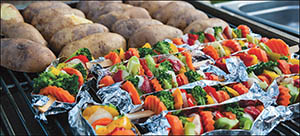When grilling, if you do not have skewers, place the fruits or vegetables on oiled aluminum foil or directly on the grill if the pieces are large.
By Alison Crane
It’s summertime and if you have a garden, hopefully, you are starting to enjoy its abundance. If you don’t have time or space for growing much right now, then the local farmers market is a great way to get locally grown fruits and vegetables for a good price. But once those lovely vegetables are lying on your counter or windowsill, what should you do with them? Grill ‘em!
Grilled vegetable or fruit kabobs are a delicious and healthy way to help your family get the servings they need for good nutrition. You can grill what you need for one person or for the whole party and then use leftovers in a variety of dishes the next day.
If you are new to grilling vegetable or fruit kabobs, getting started is easy. Most of the produce grown in Arkansas cooks well on the grill. Squash, zucchini, and eggplant are some of my favorites. Add in some onions, mushrooms, and peppers and you can easily “eat your colors.” Grilled corn can be eaten on the cob or used in a variety of recipes. For fruits, pretty much any fruit you can get to stay on a skewer can be grilled.
When using wooden skewers be sure to soak them in water for about 30 minutes before adding fruits or veggies. (I like to rinse them off once they have soaked.) Place all of one kind of vegetable or fruit on the skewer or mix and match by color or make a pattern. Keep in mind that not all vegetables cook at the same rate so you might need to precook some or cut smaller pieces.
Many times, fruits and vegetables pair up together for a sweet and tangy combination. Be sure to leave a little space in between each piece for even cooking on the grill. If you do not have skewers, then place the fruits or vegetables on oiled aluminum foil or directly on the grill if the pieces are large.
Marinating your fruits or vegetables for 15 – 30 minutes before skewering can help draw out excess moisture and encourage caramelization when cooking. If you don’t have time to marinate, then you can baste the kabobs with the marinade sauce while cooking. Marinades do not have to be fancy, they can be as simple as some olive oil, balsamic vinegar/lemon juice, and a few herbs and spices. For fruit kabobs, a little honey or maple syrup can be combined with lemon juice and a dash of cinnamon, or just squeeze a little lemon or lime juice over it.
Cooking times vary for vegetables and it helps to either cook the same vegetables together on a skewer or vegetables with similar cooking times. Squash, zucchini, eggplant, onions, peppers, and large mushrooms need about 15 minutes at 350°.
Button or small mushrooms need only 10 minutes or less. Carrots, parsnips, new potatoes, regular potatoes, and sweet potatoes need to cook longer (30-45 minutes), but you can precook them to speed up the process. Any way you prepare them grilled fruits and vegetables can be an easy addition to any meal and a great way to use up your garden surplus. For more information on how to prepare or preserve your garden produce, contact the Garland County Extension office at 501-623-6841 or visit our website at www.uaex.uada.edu. Like us on Facebook: Garland County Extension.
Alison Crane is a Family and Consumer Sciences Agent with the Garland County Extension Service. The University of Arkansas System Division of Agriculture offers all its Extension and Research programs to all eligible persons without regard to race, color, sex, gender identity, sexual orientation, national origin, religion, age, disability, marital or veteran status, genetic information, or any other legally protected status, and is an Affirmative Action/Equal Opportunity Employer.








